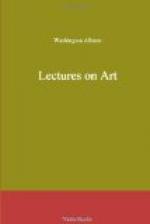And here may occur a question,—which might well be left to the ultra advocates of the cui bono,—whether a simple flower may not sometimes be of higher use than a labor-saving machine.
As to the objects whose effect on the mind is here discussed, it is needless to specify them; they are, in general, all such as are known to affect us in the manner described. The catalogue will vary both in number and kind with different persons, according to the degree of force or developement in the overruling Principle.
We proceed, then, to reply to such objections as will doubtless be urged against the characteristic assumed. And first, as regards the Beautiful, we shall probably be met by the received notion, that we experience in Beauty one of the most powerful incentives to passion; while examples without number will be brought in array to prove it also the wonder-working cause of almost fabulous transformations,—as giving energy to the indolent, patience to the quick, perseverance to the fickle, even courage to the timid; and, vice versa, as unmanning the hero,—nay, urging the honorable to falsehood, treason, and murder; in a word, through the mastered, bewildered, sophisticated self, as indifferently raising and sinking the fascinated object to the heights and depths of pleasure and misery, of virtue and vice.
Now, if the Beauty here referred to is of the human being, we do not gainsay it; but this is beauty in its mixed mode,—not in its high, passionless form, its singleness and purity. It is not Beauty as it descended from heaven, in the cloud, the rainbow, the flower, the bird, or in the concord of sweet sounds, that seem to carry back the soul to whence it came.
Could we look, indeed, at the human form in its simple, unallied physical structure,—on that, for instance, of a beautiful woman,—and forget, or rather not feel, that it is other than a form, there could be but one feeling: that nothing visible was ever so framed to banish from the soul every ignoble thought, and imbue it, as it were, with primeval innocence.
We are quite aware that the doctrine assumed in our main proposition with regard to Beauty, as holding exclusive relation to the Physical, is not very likely to forestall favor; we therefore beg for it only such candid attention as, for the reasons advanced, it may appear to deserve.




